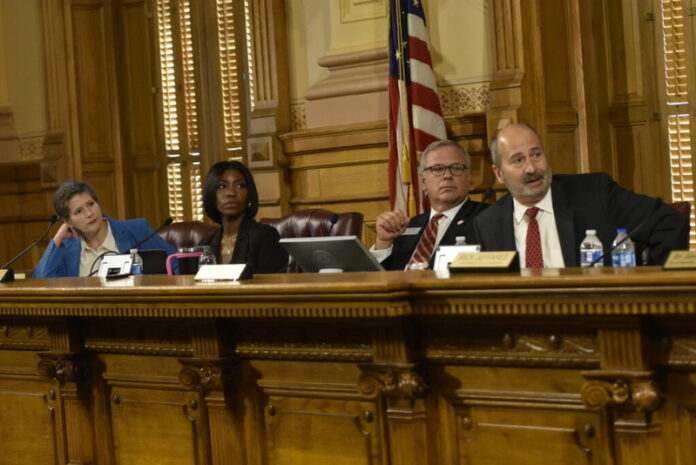
ATLANTA (Georgia Recorder) — A pair of election bills the Georgia Senate passed Wednesday propose new State Election Board powers, remove Georgia from multi-state voter rolls sharing databases and allow voters to request hand-marked paper ballots.
The Senate voted along party lines Wednesday for the sweeping voting rules changes proposed in House Bill 397 as well as Senate Bill 214, which aims to encourage voters to use pencils or pens to complete ballots instead of electronic voting machines as is the primary option now.
Sen. Jason Esteves, an Atlanta Democrat, criticized plans in the bill sponsored by Rep. Tim Fleming, a Covington Republican, that would force the state to withdraw from the Electronic Registration Information Center (ERIC), a system that backers including Republican Secretary of State Brad Raffensperger contend helps Georgia maintain more accurate voter rolls by sharing voter data across multiple states.
The Fleming bill would need a final House vote by Friday to clear both chambers.
Esteves said a new system of multiple bilateral agreements to replace ERIC would be much more expensive and inefficient than the status quo.
Republican lawmakers argue the state should withdraw from a third-party system that could lead to voter privacy concerns.
Some Democratic members of the House have voiced opposition to a bill restricting counties from accepting hand-delivered absentee ballots on the weekend before an election, arguing that this could prevent college students and military personnel from voting.
Duluth Democratic Sen. Nabilah Islam Parkes slammed the bill for not securing elections but instead sabotaging them by “sewing distress, empowering conspiracy theorists, and silencing the voices of everyday Georgians.”
“Why are we tossing out a system that works and replacing it with political theater? she said. “HB 397 makes it harder, again, for folks to vote by mail.”
There are also several provisions in the bill aimed at expanding the power of the State Election Board, which has been under fire for its rulemaking in the run-up to the general election in 2024.
The bill would place the election board under the administration of the state accounting office instead of the secretary of state’s office.
State election officials would also have access to all state investigative reports and communications between the secretary of state and the local election superintendents. The bill would also spell out State Election Board rulemaking powers with proposed year-round authority to adopt election rules so long as they don’t take effect within 60 days of an election, according to the legislation.
Cumming Republican Sen. Dolezal rejected claims the legislation as the latest Republican voter suppression effort.
Dolezal said the increased minority voter participation since the passage of the Senate Bill 202 election law overhaul in 2021 demonstrates the law does not discourage minority voting.
“This bill in front of us here deals with processes by which we review who has moved out of the state,” Dolezal said. “We go through the tabulation process and when the election board is going to post information.
“Bringing up this debunked notion that was floated first by Stacey Abrams and then floated by Joe Biden and used to weaponize Major League Baseball to leave the state for a state who has very similar voting laws that we have, was ridiculous then is ridiculous today,” Dolezal said
Last week, Republican legislators advanced lHB 397 out of the Senate Ethics Committee, after making some last-minute changes were made that its sponsors said should alleviate some concerns heard during public meetings.
The current version of the bill no longer includes new mandates for requiring local election officials to hand count ballots as voting precincts are closing down for Election Day. It no longer includes a provision that would have allowed the State Election Board to hear appeals to a controversial mass voter challenge after complaints are settled by county election boards.
Paper ballots expansion spurs debate
Sylvania Republican Sen. Max Burns defended his Senate Bill 214 hand marked ballot measure as being significantly less costly than the projected $66 million needed to upgrade the current electronic voting system.
Burns said the legislation gives Georgians casting ballots during early voting and election days the option of paper ballots or the electronic touchscreen system that’s been used for statewide elections since 2020.
Burns said Wednesday that the cost of acquiring new scanners and implementing the new system is estimated to be less than half that of enhancing the current system.
Under the new legislation, the state would be required to use new voting equipment that features optical scanning systems for scanning and tabulating hand-marked paper ballots.
The new process would allow voters to request ballots similar to absentee ballots when they visit a polling place during early voting or on an Election. Day.
“The ballot itself is marked by the individual voter,” Burns said. “The voter uses a hand marking device, often called the pen, that marks the ballot that they can read. There is no QR code. They take that hand-marked paper ballot and they submit it to a scanner, a tabulator that senses the mark on the ballot.”
Sen. Sally Harrell, an Atlanta Democrat, cautioned against expressed hesitation in rushing through a significant change in the state’s election system at this late stage in the legislative process, which could result in further financial mismanagement. Friday is the last day of the 2025 Georgia General Assembly.
Harrell wondered aloud why Republican senators rejected her amendment proposing hand-marked paper ballots when lawmakers voted in 2019 to switch to an electronic voting system.
The state has spent more than $107 million on the Dominion Voting Systems that’s been used in statewide elections since 2020.
Harrell requested more information regarding the costs associated with implementing Burns’ new ballot plan while the state is still under a 20-year contract to pay off the Dominion machines until 2040.
Currently, President Donald Trump’s administration is advocating a major overhaul of elections, including guidance advising states against using barcodes or QR codes to tabulate votes.
“I have some of the same concerns (Esteves) raised about things coming from the federal government about what we can and can’t do over and over again,” Harrell said. “We are deciding to spend money on certain types of machines that we aren’t going to use long enough to justify the expenses. We made that mistake in 2019 and we’re making that same mistake now.”






